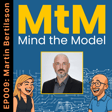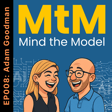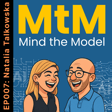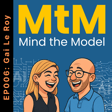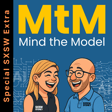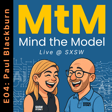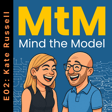
Episode 001 - Kellyn Coetzee
Welcome to the very first episode of Mind the Model: The Modern Marketer's Guide to AI! Your hosts, Emmalee Crellin and Nathan Guerra, kick off their journey into the AI rabbit hole by sitting down with none other than Kellyn Coetzee, Head of Digital at Zenith Australia and a leading voice in applied AI.
This episode is packed with practical tips, ethical considerations, and a visionary look at the future of marketing with AI.
Get ready to revolutionize your approach to AI as Kellyn shares her expert insights on:
• Navigating the "AI Black Hole": Discover how Kellyn tackles tricky AI challenges, bouncing between tools like Anthropic artifacts and Gemini to build mini-websites and overcome token limits.
• Mastering the Art of Prompting: Learn Kellyn's two-pronged approach to AI prompting, including the powerful RISEN framework (Role, Instruction, Steps, End Goal/Context, Narrowing) for structured outputs, and even her secret "bribery" technique to get the best results!
• Democratizing AI Skills: Hear Kellyn's passion for making AI accessible to everyone, shifting roles towards more strategic, collaborative, and client-facing work.
• AI's Impact on Creativity: Unpack the role of AI in advertising creativity, from scaling AB testing to optimizing variations, and why the human element remains irreplaceable.
REFERENCES:
Character.ai: AI-powered platform that allows users to create and interact with customized digital characters through text and voice. Users can chat with characters based on fictional figures, historical personalities, or even popular culture icons, as well as create their own chatbots
RISEN - the format that Kellyn uses for prompting
More information can be found here: https://clickup.com/general-resources/playbooks/ai-prompts
- R - Role: Tell the AI who it should be or what expert persona it should adopt.
- I - Input: Give the AI the specific information, data, or clear instructions it needs to work with.
- S - Steps: Outline the exact sequence of actions you want the AI to perform to complete the task.
- E - End goal: Clearly describe the final result or the specific format you expect for the output.
- N - Narrowing: Add specific constraints, rules, or limitations to make the AI's response more focused.
News that was mentioned in the chat:
https://www.pbs.org/newshour/politics/vance-rails-against-excessive-regulation-at-paris-ai-summit
AI For Everyone - AI Course that Em mentioned:
https://www.coursera.org/learn/ai-for-everyone
And for the record, Claire Polkinghorne is Australia's most capped footballer, with 169 appearances.
